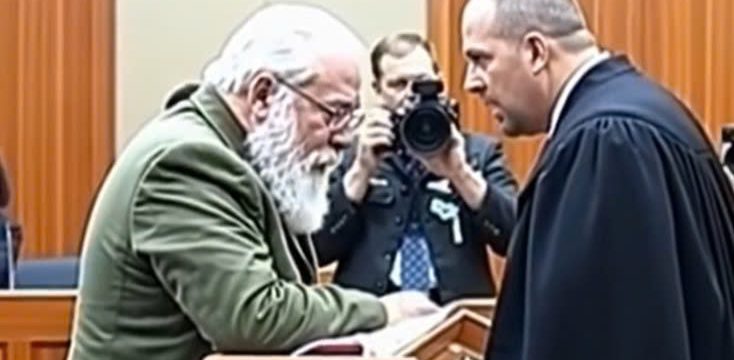Green Day’s legendary frontman, Billie Joe Armstrong, has recently made waves by expressing his intent to renounce his U.S. citizenship. This bold statement came on the heels of a controversial Supreme Court ruling overturning Roe v. Wade. Armstrong, known for his outspoken nature, made this announcement during his band’s concert at London Stadium last Friday, much to the surprise and applause of fans.

Armstrong has been at the forefront of Green Day since its inception in 1987, a band that has become synonymous with punk rock and rebellion. However, it seems that this time, his rebellion has taken on a more personal tone. During the performance, Armstrong took the opportunity to share his discontent with the current state of affairs in America. He passionately told the crowd, “I’m renouncing my citizenship,” adding that he planned to spend more time in Europe moving forward.
The rock icon didn’t stop there. He doubled down on his statement, emphasizing that he wasn’t joking about his decision. “Oh, I’m not kidding,” Armstrong declared to the audience. “You’re going to get a lot of me in the coming days.” This declaration was met with enthusiastic cheers from fans, many of whom share his frustration with the political climate in the United States.
The following evening, during a show in Huddersfield, England, Armstrong continued his critique of the U.S. He expressed his anger and disappointment over the Supreme Court’s recent decision, which has been a hot-button issue across the globe. The decision to overturn Roe v. Wade has sparked protests, debates, and heated discussions about women’s rights, leaving many Americans feeling disillusioned.
Armstrong’s public denouncement has led to a mixed response. While some fans and supporters have praised him for standing up for his beliefs, others have criticized his decision to renounce his citizenship. The punk rock star’s comments have reignited conversations about the role of celebrities in politics and whether they should use their platform to voice their personal opinions.
Yet, Armstrong is far from alone in expressing his outrage over the recent political developments. Other high-profile celebrities have also taken to the stage to voice their disapproval. For instance, pop sensation Olivia Rodrigo didn’t hold back during her performance at the iconic Glastonbury music festival in the U.K. that same weekend.
In a moment that quickly went viral, Rodrigo dedicated one of her songs to the Supreme Court justices who had voted to overturn Roe v. Wade. “This song goes out to the justices: Samuel Alito, Clarence Thomas, Neil Gorsuch, Amy Coney Barrett, Brett Kavanaugh,” she declared before a massive crowd. “We hate you!” The young pop star’s bold statement was met with resounding cheers from the audience, reflecting the widespread discontent among many young Americans and fans abroad.
Rodrigo’s actions at Glastonbury highlighted how the issue has transcended American borders, drawing reactions from people worldwide. The decision to overturn Roe v. Wade has not only affected those in the United States but has also sparked conversations in other countries about the direction of American politics and its global influence.
These high-profile reactions from Armstrong and Rodrigo illustrate a growing trend among artists who use their platforms to speak out against what they perceive as injustices. As musicians with massive followings, their statements carry significant weight, especially among younger audiences who look up to them. For many, these celebrities are not just entertainers but voices for social change.
Armstrong’s announcement to renounce his U.S. citizenship might be a symbolic gesture, but it underscores a deeper frustration that many Americans feel in light of recent political developments. His decision to potentially relocate to Europe signals a desire to distance himself from the current climate in the United States. Whether or not he follows through with his statement remains to be seen, but it’s clear that he has made his position known.
Meanwhile, Rodrigo’s outspoken performance at Glastonbury adds another layer to the ongoing discourse. By calling out the justices by name, she sent a powerful message about accountability and the influence that these decisions have on people’s lives. Her willingness to use her platform in this way highlights a shift in the entertainment industry, where stars are increasingly willing to take a stand on political and social issues.
In the end, the actions of Armstrong and Rodrigo reflect a broader sentiment among many Americans who are disillusioned with the state of their country. As more public figures speak out, it remains to be seen how their influence will shape public opinion and, ultimately, political action. For now, their statements have certainly made headlines and sparked conversations, both in the United States and abroad.
Only time will tell if Armstrong will actually go through with renouncing his citizenship or if his statements were simply a dramatic way to express his anger. Regardless, his words have left an impact, prompting fans and critics alike to reflect on the current state of American politics and what it means for the future. Meanwhile, artists like Rodrigo continue to prove that the stage can be a powerful platform for protest, reminding everyone that sometimes, music and politics are more intertwined than we might think.





